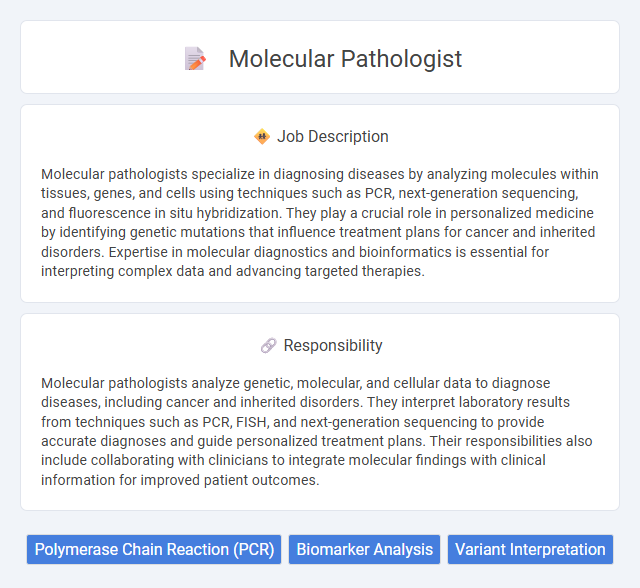
Molecular pathologists specialize in diagnosing diseases by analyzing molecules within tissues, genes, and cells using techniques such as PCR, next-generation sequencing, and fluorescence in situ hybridization. They play a crucial role in personalized medicine by identifying genetic mutations that influence treatment plans for cancer and inherited disorders. Expertise in molecular diagnostics and bioinformatics is essential for interpreting complex data and advancing targeted therapies.
Individuals with a strong background in biology, genetics, and analytical skills are likely to be suitable for a career as a molecular pathologist. Those who enjoy working with laboratory technologies and analyzing complex data might find this job fulfilling. People who prefer direct patient interaction or less technical work may be less compatible with this role.
Qualification
Molecular pathologists require a medical degree followed by specialized training in pathology, often completing a residency in anatomic or clinical pathology and a fellowship in molecular genetic pathology. Board certification, such as from the American Board of Pathology, is essential to validate expertise in molecular diagnostics and genetic analysis. Advanced knowledge of molecular biology techniques, genomics, and bioinformatics is crucial for accurate disease diagnosis and personalized treatment planning.
Responsibility
Molecular pathologists analyze genetic, molecular, and cellular data to diagnose diseases, including cancer and inherited disorders. They interpret laboratory results from techniques such as PCR, FISH, and next-generation sequencing to provide accurate diagnoses and guide personalized treatment plans. Their responsibilities also include collaborating with clinicians to integrate molecular findings with clinical information for improved patient outcomes.
Benefit
The role of a molecular pathologist likely offers competitive salaries and opportunities for professional growth due to the specialized knowledge required. There is a strong probability of job stability given the ongoing advancements in personalized medicine and genetic testing. Benefits may also include involvement in cutting-edge research and the ability to impact patient care through precision diagnostics.
Challenge
Molecular pathologists likely face the challenge of accurately interpreting complex genomic data to diagnose diseases, which requires staying updated with rapidly evolving technologies and research. The probability of encountering ambiguous or incomplete data may complicate decision-making processes, demanding strong analytical skills and continuous learning. Adaptation to emerging diagnostic tools and integrating multidisciplinary knowledge is essential to overcome these challenges effectively.
Career Advancement
Molecular pathologists specialize in diagnosing diseases by analyzing genetic and molecular markers, utilizing advanced techniques like next-generation sequencing and polymerase chain reaction. Career advancement opportunities include roles such as senior molecular pathologist, laboratory director, or research scientist, often requiring additional certifications and leadership skills. Expertise in bioinformatics and emerging molecular technologies enhances prospects for positions in academic medicine, pharmaceutical companies, and personalized medicine initiatives.
Key Terms
Polymerase Chain Reaction (PCR)
A Molecular Pathologist specializing in Polymerase Chain Reaction (PCR) analyzes genetic material to detect mutations, infectious agents, and hereditary conditions with high precision. Expertise in PCR techniques enables accurate diagnosis, guiding targeted therapies and personalized medicine. Proficiency in interpreting PCR results is crucial for advancing molecular diagnostics and improving patient outcomes in clinical pathology.
Biomarker Analysis
A molecular pathologist specializing in biomarker analysis utilizes advanced genomic and proteomic techniques to identify and interpret molecular alterations in patient tissue samples. This role involves detecting specific biomarkers that guide targeted therapy decisions, improve diagnostic accuracy, and predict disease prognosis in oncology and personalized medicine. Proficiency in next-generation sequencing, PCR-based assays, and data integration is essential for successful biomarker-driven clinical management.
Variant Interpretation
Molecular pathologists specializing in variant interpretation analyze genetic mutations to determine their clinical significance and guide patient diagnosis and treatment. Utilizing advanced genomic sequencing techniques, they identify pathogenic, likely pathogenic, or benign variants within a patient's DNA sequence. Their expertise directly impacts precision medicine by informing targeted therapies based on molecular profiles of diseases such as cancer and inherited disorders.
 kuljobs.com
kuljobs.com